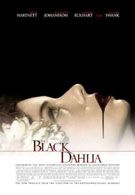Early into The Black Dahlia, I stopped caring about who killed the actress in such a grisly fashion, and began pondering who killed the movie. Was it screenwriter Josh Friedman (War Of The Worlds), making every line sound like a bad parody of 1940s Noir dialect? How about director Brian De Palma, hamming up shots and reveling in his decade-long losing streak? Or maybe the limp cast, struggling to show emotion like women who just received botox treatments?
Regardless of who deserves the bulk of the finger-pointing, they all play a role in the crashing failure of The Black Dahlia, a movie that is too stupid to be taken seriously, too self-important to be entertaining. The story is a fictionalized account of the gruesome murder of Elizabeth Short, a 22-year-old actress who was found dead and mutilated in a vacant Los Angeles lot in 1947. The cops never found the killer, and the images of “The Black Dahlia”—cut in half at the waist, disemboweled, with a knife-wound from ear to ear—were so repulsive, they were hidden from the public.
Based on the novel by James Ellroy (L.A. Confidential), The Black Dahlia takes this unsolved mystery and twists it into a grimy, Noir thriller. Dwight “Bucky” Bleichert (Josh Hartnett) and Lee Blanchard (Aaron Eckhart) become friends after the healthiest of situations—beating each other to bloody pulps in a boxing ring. The cops decide to work as partners soon after, hitting the seedy streets of L.A. in hopes of wiping away the scum that lingers. When “The Black Dahlia” case arises, they are fascinated by the sickening nature of the crime, and head off to find answers buried beneath the filth, corruption and lies.
When done right, there is nothing better than a good Noir movie—take Sunset Blvd, Chinatown—but in recent years, they have been harder to come by. The Black Dahlia plays like a bad imitation of its predecessors, starting with the meaningless, vague narrations by Hartnett (“Nothing stays buried forever. Nothing”), spoken in his trademark monotone mumblings. Clearly an Honor Roll student at the wooden school for acting, he is capable of one expression only; when he tries to emote, it just might make you cry instead. Not faring any better is Scarlett Johansson as the beauty who hangs around the 2 cop buddies—“never between us, always in the middle”—standing around holding a cigarette, pouting, and staring off into space. Their scenes play like a battle between bland and blander.
Although the actors are generally disappointing—even two-time Oscar winner Hilary Swank, dreadfully miscast as a sexy femme fatale with a floating accent—they aren’t given much to work with. De Palma (Carrie, or more recently, Femme Fatale) seems so enthralled with his movie, that he spends more time winking and nudging at us than bothering to shoot a coherent narrative. The story is a jumbled mess: characters behave in erratic ways without any warning signs, relationships lack development, and there are at least five different endings, each more absurd than the one before.
The movie is beautiful to look at, but irritating to sit through. Jarring instrumentals overlay many pseudo-emotional scenes, and the most interesting element, the murder, fades into the background to make way for less thrilling subplots. It’s an incredibly disjoined film from the start, and to sum up its stupidity with one example, there are countless references to how Hilary Swank and Mia Kirshner (playing the slain victim in old footage) bear an eerie resemblance to one another. The only freaky thing is how dissimilar they look, and hearing it endless times doesn’t make it any more accurate. The Black Dahlia, sadly, takes a haunting true story and reduces it to a colorless hodgepodge.
Most Popular




